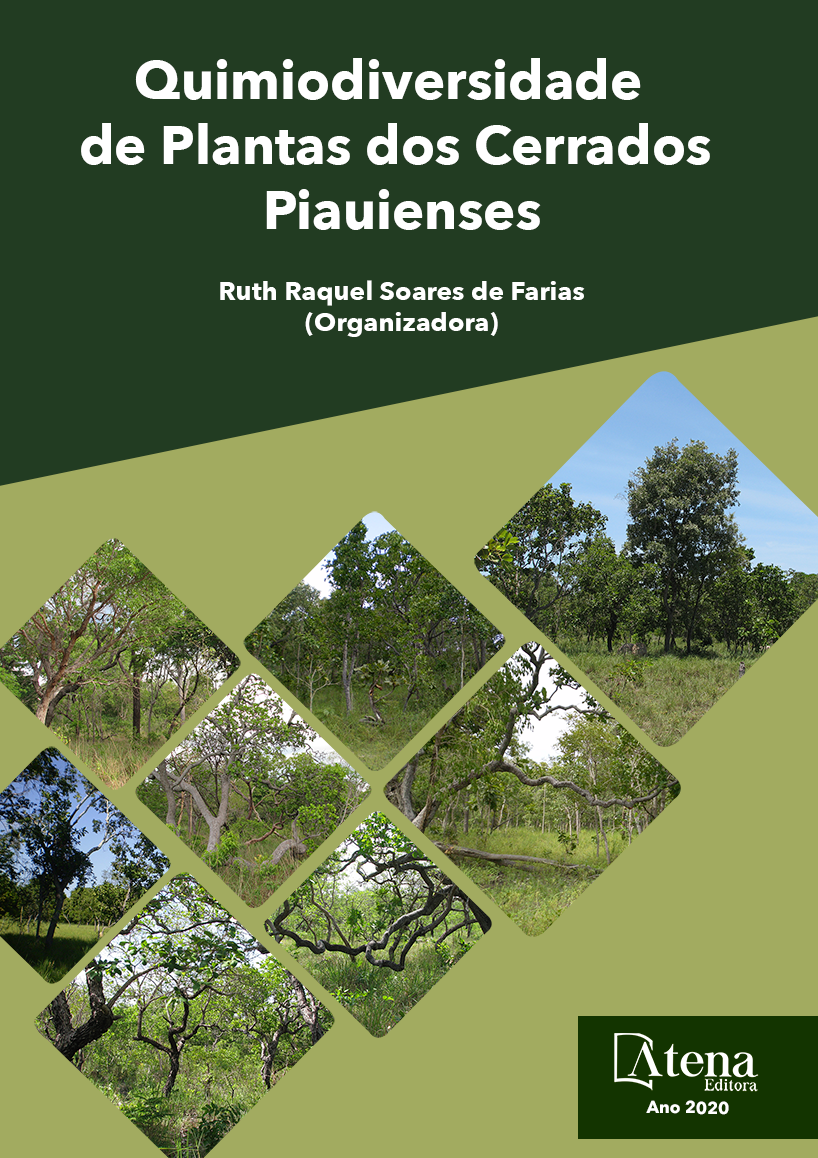
QUIMIODIVERSIDADE COMPARATIVA E POTENCIAL BIOLÓGICO DE Combretum duarteanum CAMBESS. EM DUAS REGIÕES DO CERRADO PIAUIENSE
A espécie Combretum duarteanum
Cambess. é de relevante interesse devido ao
histórico de potencialidades farmacológicas,
já conhecida na família Combretaceae e no
gênero Combretum. O presente trabalho teve
como objetivo investigar a quimiodiversidade
e o potencial biológico dos extratos hexânico,
etanólico e aquoso das folhas de C. duarteanum
coletadas no Cerrado Setentrional e Meridional
do estado do Piauí. O perfil químico dos
extratos foi obtido por cromatografia líquida
de alta eficiência. A atividade antioxidante
foi avaliada pelos ensaios dos radicais
2,2-difenil-1-picrilhidrazila (DPPH), hidroxila e
óxido nítrico, substâncias reagentes ao ácido
tiobarbitúrico (TBARS) e redução do íon Fe3+
à Fe2+. A determinação do teor de fenóis totais
foi realizada pelo método de Folin-Ciocalteu e
de flavonoides totais por redução com cloreto
de alumínio. A atividade anticolinesterásica
foi investigada pelo método de Ellman e
citotoxicidade pelo método de brometo de
3-(4,5dimetildiazol-2-il)-2,5difeniltretrazolium
(MTT), frente as linhagens de células tumorais
humanas (cólon, ovário e glioblastoma). O
extrato aquoso de C. duarteanum do Cerrado
Setentrional apresentou o maior potencial
antioxidante nos ensaios testados. Os extratos
etanólicos de C. duarteanum do Cerrado
Setentrional e Meridional apresentaram
atividade citotóxica frente as três linhagens.
Todos os extratos de C. duarteanum do Cerrado Setentrional e o extrato etanólico de
C. duarteanum do Cerrado Meridional demonstraram atividade anticolinesterásica. Os
ensaios realizados demonstram que há uma diferença no perfil químico e biológico dos
espécimes, sugerindo que as relações ecológicas devem ser levadas em consideração
em estudos químico/farmacológico.
QUIMIODIVERSIDADE COMPARATIVA E POTENCIAL BIOLÓGICO DE Combretum duarteanum CAMBESS. EM DUAS REGIÕES DO CERRADO PIAUIENSE
-
DOI: 10.22533/at.ed.3482005031
-
Palavras-chave: Atividade antioxidante. Atividade anticolinesterásica. Atividade citotóxica. Fitogeografia. Fitoquímica.
-
Keywords: Antioxidant Activity. Anticholinesterase Activity. Cytotoxic Activity. Phytogeography. Phytochemistry.
-
Abstract:
The species Combretum duarteanum Cambess. is of relevant interest due
to its history of pharmacological potential, already known in the family Combretaceae
and in the genus Combretum. This study aimed to investigate the chemodiversity
and the biological potential of hexane, ethanolic and aqueous extracts of the leaves
of C. duarteanum collected in the northern and southern cerrados at the state of
Piauí. The chemical profile of the extracts was obtained by high-performance liquid
chromatography (HPLC). The antioxidant activity was evaluated by the test of the radicals
2,2-diphenyl-1-picrylhydrazyl (DPPH), hydroxyl and nitric oxide, reactive substances to
thiobarbituric acid (TBARS), and reduction of Fe3+ to Fe2+. The determination of total
phenolic and flavonoid content was performed by the method of Folin-Ciocalteu and
by reduction with aluminum chloride, respectively. The anticholinesterase activity was
performed by Ellman’s method. The cytotoxicity activity was tested by MTT assay (3-
(4,5-dimethylthiazol-2-yl) -2,5 difeniltretrazolium) against human tumor cell lines (colon,
ovary and glioblastoma). The aqueous extract of C. duarteanum from northern cerrado
presented the highest antioxidant potential in the test trials. The ethanol extracts of C.
duarteanum from northern and southern cerrado exhibited cytotoxic activity against the
three cell lines. All extracts of C. duarteanum from northern cerrado and the ethanol
extract of C. duarteanum from southern cerrado showed acetylcholinesterase activity.
The tests demonstrated that there is a difference in the chemical and biological potential
among the species studied. This may suggest that the ecological relationships should
be taken into consideration in chemical and pharmacological studies.
-
Número de páginas: 15
- Samara Raquel de Sousa
- Antonio Alberto Jorge Farias Castro
- Jéssica Pereira Costa
- Rusbene Bruno Fonseca de Carvalho
- George Laylson da Silva Oliveira
- Claudia do Ó Pessoa
- Chistiane Mendes Feitosa
- Paulo Michel Pinheiro Ferreira
- Mariana Helena Chaves
- Erika Thalyta Veras Pereira
- Ruth Raquel Soares de Farias
- Bruno


